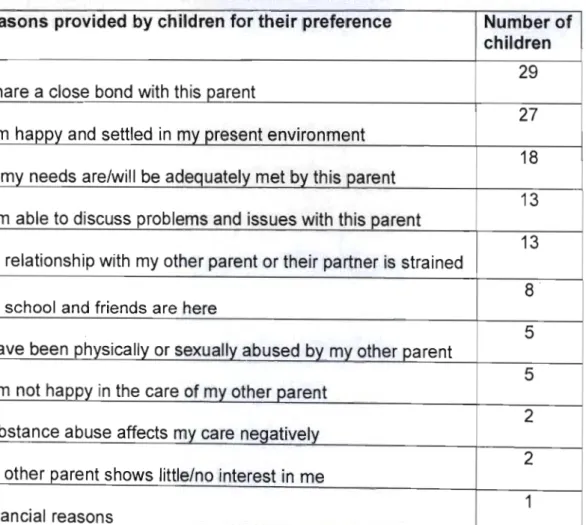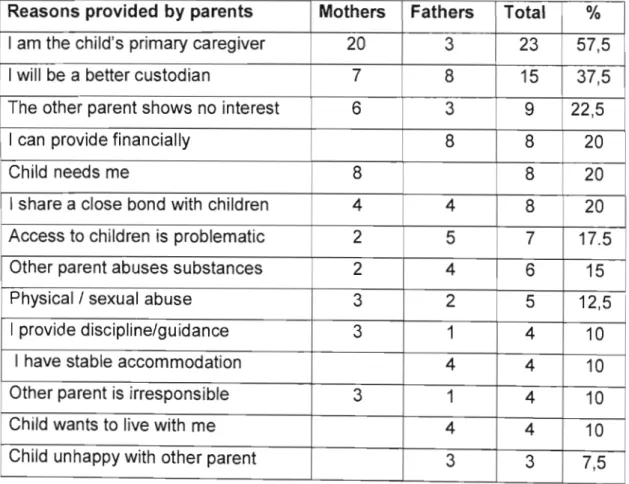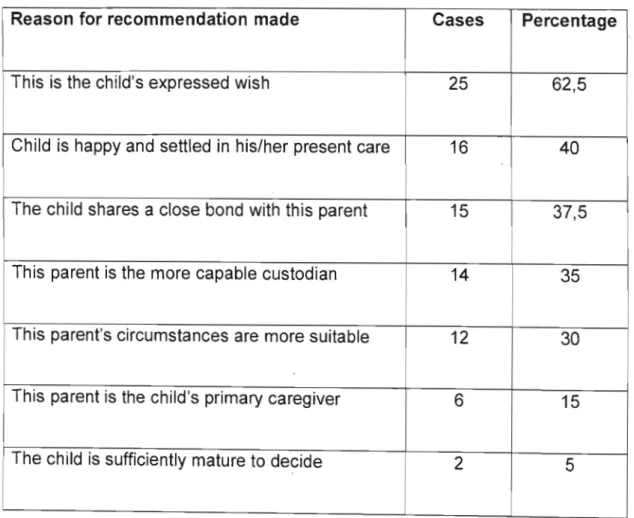This research was a descriptive study of what exists in terms of child participation in the Office of the Family Advocate when parents divorce. To the family advocates and family counselors at the Office of the Family Advocate: KwaZulu-Natal who participated in the focus group interview, thank you for sharing your knowledge and concerns.
Introduction
Motivation and value of the study
Despite the ratification of the UN Convention on the Rights of the Child in June 1995, the legislature has done little to effectively ensure children's participation in matters that affect them. To ensure and promote children's participation at the Office of the Family Advocate, a State Department and therefore a duty bearer in terms of the Convention, requires further deliberation.
Aims and objectives of this study
The concept of children's participation in decision-making raises diverse views and is, by its nature, a complex concept that requires research. According to the researcher, the latter is the type of participation that the UN treaty envisages.
Key questions
Research methodology
- Sampling method
- Methods of data collection
- Focus group interview
The above review provides a background for evaluating the involvement of children in the Family Advocate's Office investigation. The investigative practices and process developed in the Office of the Family Advocate and the opportunities provided to children to participate and express their views and feelings.
Data analysis
This culminated in the introduction of the Children (Scotland) Act 1995, which in three separate sections 6, 11(7) and. In this study, the Office of the Family Advocate took into account the wishes and preferences of the children. In this study, various reasons were advanced for the recommendations made by the staff at the Office of the Family Advocate.
Four participants are of the opinion that inquiries at the Office of the Family Advocate are adult-centred. One participant was of the opinion that the investigation at the Office of the Family Advocate is child-centred. She held that the basic premise of the investigation is the best interest of the child.
The need for training of staff at the Office of the Family Advocate is raised by Glasser. The only forum currently available for children to do this is the inquiry at the Office of the Family Advocate. Whether the Office of the Family Advocate does enough to ensure children's participation was debated in detail in the focus group.
Assessment techniques that appear most appropriate to help children participate meaningfully in the investigation at the Office of the Family Advocate. Your knowledge of and familiarity with the procedures and practical aspects at the Office of the Family Advocate.

The UN Convention on the Rights of the Child and children's
The best interest of the child and participation
- International and local framework and best
- History and the best interests principle and the
Divorce as an adversarial process: The birth of the Office of
- Dilemmas and difficulties with the adversarial approach
- State interference and family autonomy in divorce
- The establishment of the Office of the Family advocate
Family Law Offices currently exist in all sections of the High Court. Would you describe the application at the Office of the Family Advocate as more adult-focused or more child-focused?
Family Law Legislation, policies , practices and procedure relating
- The Divorce Act
- The Mediation in Certain Divorce Matters Act
- Procedure for instituting an enquiry
- Cooperation of social work and law disciplines
- Current practice and procedures: Conducting an
Children'S participation in custody and access disputes
- The position of children's participation in South Africa
- Culture as an obstacle to children 's participation
Since 1948, the courts have accepted the notion that the best interests of the child should be the overriding consideration in divorce proceedings (Keightley Fletcher v Fletcher 1948 (1) SA 130 (A). Heaton is of the view that the main problem with regard to the best interests An one of the most important roles that the family lawyer's office currently fulfills is to put the children's views before the court.
Robinson briefly describes the purposes of the Mediation in Certain Divorce Matters Act (1987) as follows:. Family counselors are mostly experienced social workers, employed by the Institute for Social Development. Also if allegations of abuse or neglect of the children are contained in the court documents.
The Mediation Act forces the two disciplines (social work and law) to work together towards a common goal: the best interests of the child. Parties are requested to attend an investigation at the Family Advocate Office together with the minor children. This means that the only consideration in determining these issues will be the best interests of the child.
Conclusion
The issue of child custody, under customary law, is largely determined by whether lobolo has been paid. Molokomme reports that custody of a child rests with the father once bogadi (similar to lobo/a in South Africa) has been paid for the child. He reports that this idea is further reflected "not only in the cultural conception of the child and childhood in general, but also in the traditional laws and customs of many communities." Ncube mentions the important aspect that people's ideas about what is in the best interests of children, their rights, duties and obligations within their families, are largely based on 'historical, social, economic, traditional and cultural dynamics of a particular society'.
Therefore, we must consider the role that culture plays in the context of children's participation at the time of divorce. An important aspect of participation is the provision of information and understanding of the processes involved. It is said that "The current fragmented judicial system contributes to the destruction of the family, undermines communities and has consequences for the future of the country" (Children First.
It is therefore necessary that any legal or judicial service, which aims to achieve this goal, is assessed as to whether it facilitates the participatory rights of children, as defined in Article 12 of the UN Convention.
Demographic Information
- The link between age and children's participation
- Children's preferences
All but one of the family advocate's and family counselor's recommendations reflected the wishes of the children. This disregard for the importance of children's participation in the investigation may also be the reason why some parents do not bring their children to the family advocate's office in certain cases. Five participants felt that the research was focused on adults and children.
There was consensus among the family advocates and family counselors in the focus group that children's participation in the investigation constituted a significant component of the entire procedure. Most participants felt that the inquiry was both child- and adult-centred. I hereby invite you to voluntarily participate in a focus group discussion on children's participation in the investigation conducted by the Office of the Family Advocate.
The focus group will be held in the meeting room, Office of the Family Advocate, Durban on Tuesday, 23 September 2003 at 9:00 am.

Factors that participate children's participation
- Language preferences
- Children's participation at the enquiry
- Enquiry conducted by a family advocate and a family
- Involvement of other professionals
- Number of inquiries held in each case
- Parents involvement in the enquiry process
Attitudes of the family advocate and the family counsellor towards
- Weight attached to child's views
- Reasons for recommendations made by family
Obstacles to children'sparticipation
- Family advocates' and family counsellors views of
- Suggestions on ensuring chil, dren's participation
34; All information collected from the child and parents is used to ensure the best interest of the child." As can be seen from the responses of participants, there is no consensus on whether the inquiry at the Office of the Family Advocate in fact child-friendly Advocate, the role and function of the office was expanded with the promulgation of new legislation, but with no accompanying increase in posts.
The Family Advocates further believed that they were doing the best they could in their current situation. This issue of high workload and limited staff is raised by Africa et al. as some of the limitations facing the Office of the Family Advocate (Africa et al.). Due to the stressful nature of the work, participants felt that staff needed regular debriefing and support.
Employees are currently resorting to case discussions with each other to alleviate some of the burden of the difficult decisions they have to make.
Conclusion
Introduction
Main findings of the research
- A more conciliatory approach to family law
- The team approach
- Attitudes of family advocates and family councilors to
- The expressed wishes of the child at the
- Ensuring a child centered approach
- The enquiry process
Recommendations
- The States duty to ensure children's participation
- Towards a more holistic approach to services
- The need for ongoing training
- Adequate staff ratios
The following recommendations are made to ensure that children's participation in matters that directly affect them is increased. Having ratified the UN Convention on the Rights of the Child and the African Charter, the State has a legal and moral responsibility to ensure that children have the opportunity to express their views and participate in judicial and administrative proceedings that influence their lives. To go beyond lip service to the needs and interests of children, appropriate budgets should be allocated to such portfolios dealing with children's welfare.
The State should allocate appropriate financial resources to ensure that there are sufficient staff to promote a team approach and to acquire the equipment and resources necessary for the assessment process. Also, all children attending the investigation process should benefit from a family lawyer and team of family counselors, to ensure a more holistic approach to the child's well-being. This should be part of a wider policy decision across provinces to ensure that issues such as language and culture do not hinder children's participation in research.
This factor undoubtedly constitutes an obstacle to children's participation in the investigative process and should be addressed through closer cooperation or by the Ministry of Justice.
Suggestions for future research
Conclusion
1999) 'At høre barnets stemme: noter fra den skotske oplevelse' i Davel, C. Ed) Children's Rights' i et overgangssamfund. Red) The fate of the child: Legal decisions on children in the new South Africa Juta and Co. Research in Social Work: A Primer Peacock Publishers, Illinois. Children's Rights in International Law' i John, M. 2000) 'The United Nations Convention on the Rights of the Child: An Evolutionary Revolution' i Davel, C. Eds.).
The African Charter on the Rights and Welfare of the Child' in Davel, C. Ed) Introduction to Children's Law Juta and Company. A Field study and evaluation' in Burman, S. Ed) The fate of the child: Legal decisions on children in the new South Africa Juta and Co. 1989) 'Children, parents and divorce: The child's point of view' Family Law Journal November 1989. United Nations Convention on the Rights of the Child (1989) African Charter on the Rights and Welfare of the Child.
To assist in the formulation of a more focused policy regarding the contribution of children to the investigation conducted at the Office of the Family Advocate.

